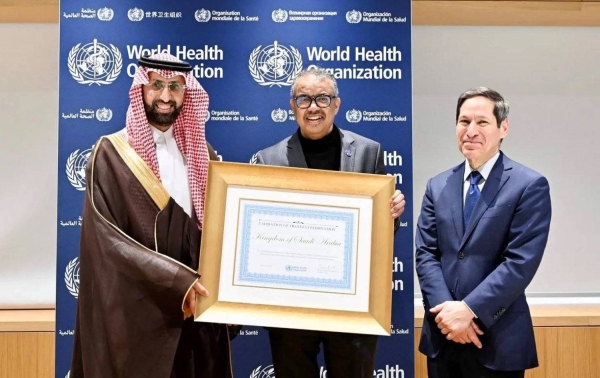Riyadh, Saudi Arabia – The World Health Organization (WHO) has recognized the Saudi Food and Drug Authority (SFDA) for its efforts in ensuring that food products in Saudi Arabia are free from industrially produced trans-fatty acids (ITFA) or artificial trans fats. This places Saudi Arabia among the top five countries globally, alongside Denmark, Lithuania, Poland, and Thailand, for implementing exemplary policies to eliminate ITFA.
The recognition ceremony, held in Geneva, saw Dr Hisham Aljadhey, CEO of SFDA, expressing gratitude for WHO’s dedication to public health and its role in setting targets to reduce chronic diseases.
Saudi Arabia’s accomplishment aligns with its Vision 2030 and the Health Sector Transformation Program, focusing on a healthy food and nutrition strategy. The SFDA initiated a comprehensive plan in 2017, emphasizing improvements in nutritional patterns, enhanced nutritional value in food products, and the implementation of policies to reduce salt, sugar, and fat content, with mandatory disclosure of calorie information by food establishments.
Since January 2020, the SFDA has successfully prohibited partially hydrogenated oils, the primary source of trans fats, from the country’s food supply.
Aljadhey emphasized Saudi Arabia’s commitment to developing integrated policies and initiatives involving both public and private sectors to promote healthier food choices.
“Deaths resulting from the consumption of artificial trans fats around the world are estimated at about 500,000 annually, and it is one of the main causes of cardiovascular diseases,” he said.
Highlighting the SFDA’s steps since 2015 to limit trans-fatty acid consumption, Aljadhey mentioned the establishment of upper limits for these fats in oil and ghee products and other food items. This contributed not only to individual health but also to reducing the economic burden of diseases related to trans fats and promoting Saudi products internationally. The SFDA’s laboratories have been upgraded to verify the absence of artificial trans fats in food products.
In recognition of Saudi Arabia’s outstanding performance, it has been appointed as the president of the International Advisory Team for the Elimination of Artificial Trans Fats. Faisal bin Sunaid, director of the Healthy Food Department at SFDA, has been named as the head of the team, responsible for evaluating member states’ requests for recognition from the organization.








